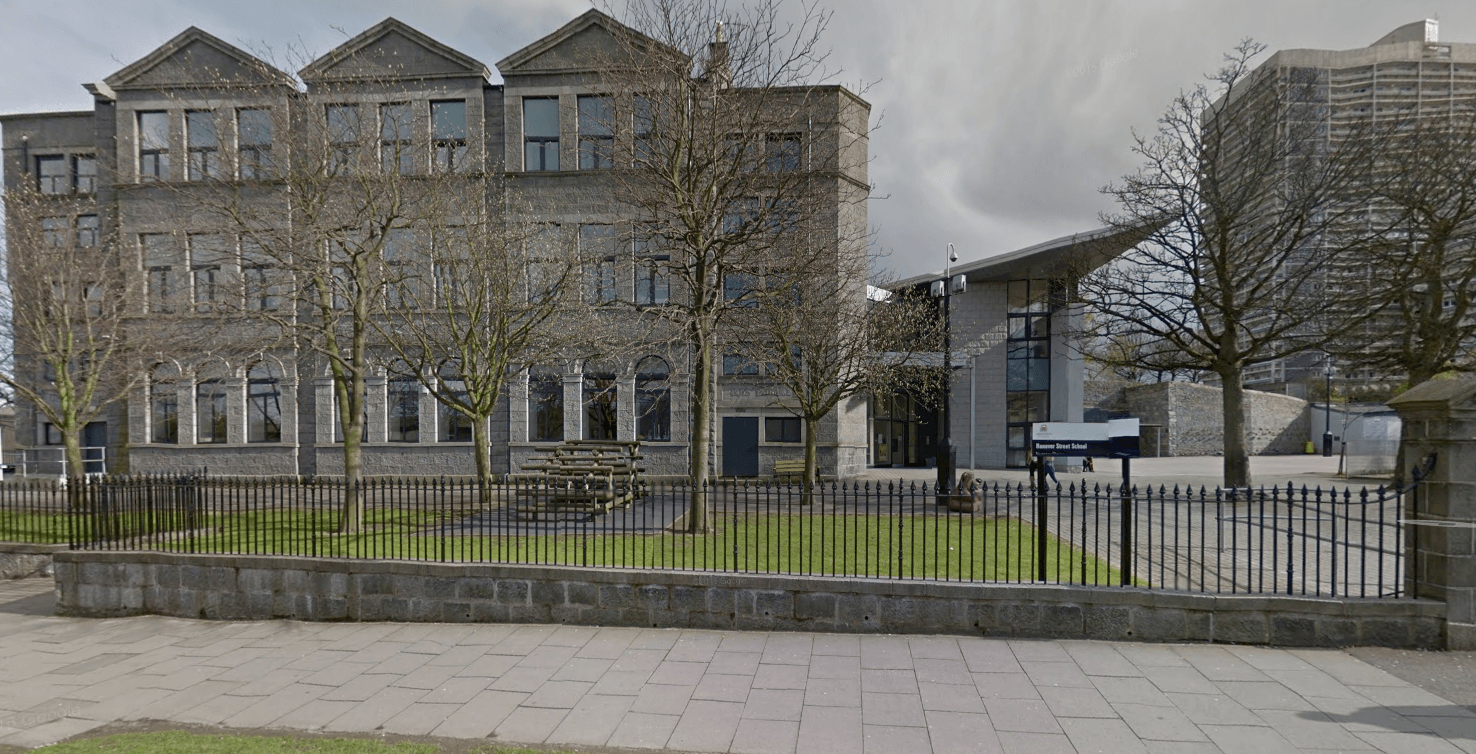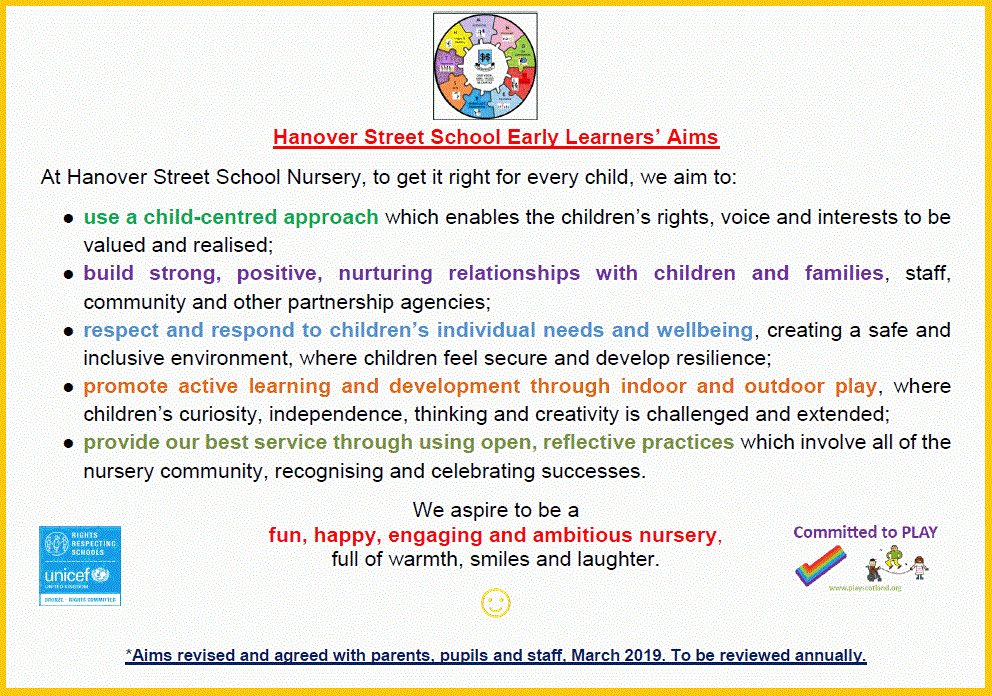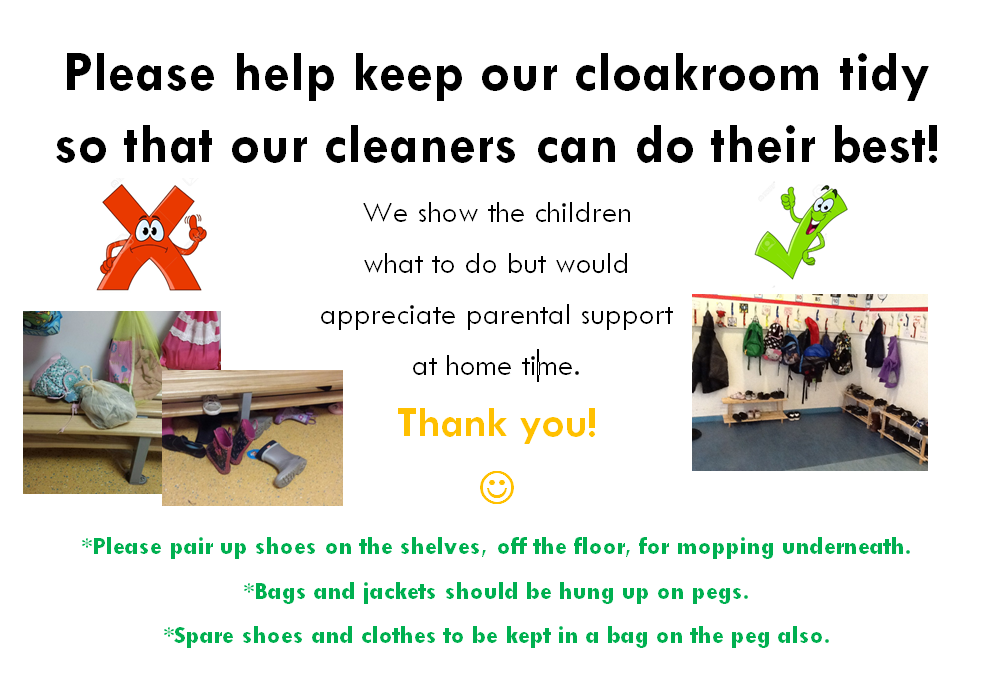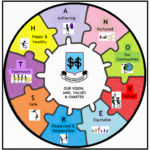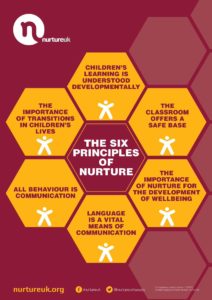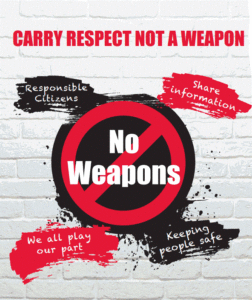“Beginning Nursery” Booklet – Info for Parents (click to use Google translate widget)
Welcome to Hanover Street School Nursery
Beginning Nursery
(Early Learning & Childcare):
Information for Parents
2018/19
(Updated March 2019)
CONTENTS
- Welcome letter from the Senior Leadership Team, Mr Markey (HT) & Miss Forbes (DHT)
- Nursery Vision, Values & Aims
- Starting Nursery/ Nursery Staff Team
- Nursery Classes and Times
- Organisation of School Day, School Term & Holiday Dates
H – Happy & Healthy
- Health Promoting School
- Snack
- Sickness & Head Lice, etc.
- School Health Service
- Medication & Tooth Brushing – Childsmile!
- Outdoor Play and Learning
- Sun Care
- Physical Education (P.E.) or “Gym”
A – Achieving
- Learning in Nursery
- Our Curriculum
- Learning Journeys
N – Nurturing
- The Principles of Nurture
- Key Worker Approach
- Birthdays
O – Our Communities
- Global Citizenship & English as an Additional Language (EAL) Service
V – Valued
- Communication
- Home/School Communication Methods
E – Engaged & Equitable
- Additional Support Needs (A.S.N.)
- Equal Opportunities and Inclusion
- Equality & Diversity
R – Respected & Responsible
- Praise and Positive Behaviour Management
- Complaints Procedure
- Expectations of Staff, Parents and Pupils
- School Uniform, School Clothing Grants
- Pupil Belongings – Valuables/Jewellery, Name Labels
S – Safe
- Child Protection
- Health and Safety
- Entering/Leaving Nursery/School Building
- Accidents/First Aid
- What to Bring
- Code of Practice for Jewellery in Physical Education
T – Teamwork
- Welcoming and Including Parents
- Parent Council, Parent Helpers, Stay & Play Sessions
| Hanover Street School
Beach Boulevard Aberdeen AB24 5HN
Tel 01224 569880 Fax 01224 589116 Nursery Mobile – 07741 236509 E-mail – hanover@aberdeencity.gov.uk Website – http://hanover.aberdeen.sch.uk/ Twitter – @HanoverStSch |
Dear Mums, Dads and Carers
Welcome to the Hanover Street School community!
We are delighted to welcome you and your family into our welcoming, nurturing atmosphere where we can work together, aiming to do the best we can for your children. We hope to give to the necessary information to make you and your child’s start in Nursery (Early Learning & Childcare) as smooth and as easy as possible.
Up until now, you have worked with Health Visitors in the development of your child. In this partnership, you may have heard of an important piece of legislation – the Children and Young People (Scotland) Act 2014, or more commonly known as the GIRFEC Approach.
Continuing from the work of the Health Visitor, Nursery, Primary and Secondary Schools also work within, and often together, in this approach.
What is GIRFEC?
GIRFEC stands for ‘Getting It Right For Every Child’. It is the Scottish Government-led approach, based on the United Nations Convention for Rights of the Child (UNCRC). It aims to make sure that our children and young people – and their parents or carers – can get all the help and support they need from birth right through to age 18.
The wellbeing of children and young people is at the heart of the GIRFEC approach. Wellbeing is about how things are going for children in their lives. The GIRFEC approach uses eight words to describe what it looks like when things are going well – in other words whether a child is getting realised, the rights of being:
- Safe
- Healthy
- Achieving
- Nurtured
- Active
- Respected
- Responsible
- Included
These words can be used to find out where a child’s strengths lie and also, if there are concerns, to see where some advice, help or support might be needed. They help everyone to understand wellbeing in the same way, and use the same language to talk about it. You can expect to hear wellbeing referred to when your child’s health visitor or school contacts you.
These wellbeing words are often known as the SHANARRI indicators and illustrated in the SHANARRI wheel, which you may see dotted around the school and medical centres, etc.:
To raise awareness of these important wellbeing aims, we have used some of these words/themes in our school acronym, “HANOVER ST.” This presents our school’s vision, values and aims, in a meaningful and memorable form for our school community. You will read more about this on page 6.
In addition to the induction visits and other presentation information, we hope that this booklet will be a useful tool for you to refer to, leading up to your child starting with us for the nursery years. If you feel you require any further information at any point, please contact Miss Forbes at the school on the above phone numbers and email address or ask a member of our nursery or office teams.
Finally, thank you very much for your continued support in your child starting nursery and welcome to the team!
Yours sincerely
The Senior Leadership Team (SLT)
Mr Alan Markey, Head Teacher
Miss Gillian Forbes, Depute Head Teacher
NURSERY VISION, VALUES & AIMS
Vision Statement
Hanover Street School’s vision is to create a welcoming, friendly, happy and safe environment to enable our children to achieve to their full potential and become successful learners, confident individuals and responsible, effective contributors to society.
School Charter and Acronym
To make the above vision and aims more meaningful and memorable to the whole school community, we display and simplify these aims in the charter below, which uses the acronym “HANOVER ST.”
H – Happy & Healthy
A – Achieving
N – Nurturing
O – Our Communities (Being part of & involved with them)
V – Valued
E – Engaged & Equitable
R – Respected
S – Safe
T – Teamwork
*To detail this vision, most of this booklet is organised under these headings
STARTING NURSERY
Who will you meet, speak to or work with your child?
Staff
Head Teacher – Mr Alan Markey
Depute Head Teacher – Miss Gillian Forbes
School Administrator – Mrs C Mutch
School Support Assistants – Mr L. Wilson & Mrs P Glendinning
The Nursery Team
At any one time, there is a minimum of 4 practitioners in the nursery.
Nursery Teacher:
Mrs Leanh La Gray
Senior Early Years Practitioners (S.E.Y.P)
Mrs Sarah Lemmon (Mon – Fri)
Early Years Practitioners (E.Y.Ps)
Mrs Ludmilla Barkovska (Mon – Fri)
Miss Kirsty Anderson (Mon – Fri)
Mrs Rhonda Gauld (Mon & Tues)
Mrs Morag Scott (Wed, Thurs & Fri)
*These staffing arrangements may change. You will be kept informed of any changes.
Throughout the year you may meet various teaching and Early Years Practitioner students working with us on placement.
Attendance
Children should attend nursery as much as possible. To keep the place allocated by the Early Years Team at Aberdeen City Council, each child should attend at least 3 days per week, unless unable to do so due to illness. Please let the nursery know via mobile 07741 236509 (a short text will do), or call via the school office on 01224 569880, if your child is ill and unable to attend. Prolonged absence from nursery without reason may, unfortunately, result in the loss of your child’s nursery place.
NURSERY CLASSES & TIMES
Hanover Street School Nursery is an 80 place nursery. We have up to 40 children in each A.M. and P.M. session.
Nursery Times
Morning Class 8.30am – 11.40am
Drop off between 8.30am – 8.50am
Pick up between 11.20am – 11.40am
Afternoon Class 12.20pm – 3.30pm
Drop off between 12.20pm – 12.40pm
Pick up between 3.10pm – 3.30pm
The main school door will not be open before 8.30am or 12.20pm.
Please do not arrive at school before these times.
We have a 20 minute soft start and soft finish time at the beginning and end of each session. Parents and older siblings, who are in the Primary stages of Hanover Street School, are welcome to stay and play briefly between 8.30 – 8.50am, and 3.15 – 3.30pm.
Parents, however, are responsible for the behaviour and safety of the older children in the nursery, at this time.
At drop off time…
- Please come into the nursery and sign your child in, indicating which adult will pick them up. If someone arrives, who is different from the name written to collect the child, we will phone parents to gain verbal permission to take that child home, ensuring child safety.
- Please encourage your child to get ready (jacket off, shoes changed, bag on peg) as independently as possible.
- Please encourage your child to leave their peg area tidy and nothing on the floor which could be a trip hazard for themselves or other children/adults.
- Do let the nursery team know any important information about your child to ensure a smooth transition into nursery.
At pick up time…
- Please come in to nursery and sign your child out.
- Your child may be busy playing or reading; please go over and join them!
- If a member of the nursery team has any information to share with you, we will speak to you at this time.
- Please return to nursery by 11.35am/3.25pm so we can share any news with you and to allow your child to show anything they would like you to see before they leave. This will allow the team to continue with vital planning and preparation time.
- Please encourage your child to get ready (jacket on, shoes changed, bag on peg) as independently as possible. Please encourage your child to leave their peg area tidy and nothing on the floor which could be a trip hazard for themselves or other children/adults.
*It is very important that children are collected on time. Young children can become confused and upset if they are left at nursery once all their classmates have left.
As a nurturing school, we promote communication between children, children and adults, adults/adults, etc. We encourage mobile phones to be put away and spend these few minutes talking with your child about what they have done in nursery that day, what they’ve learned, what they’ve played with, new friends they’ve made, etc.
H – HAPPY & HEALTHY
Health Promoting School
As a health promoting school we reinforce a positive message encouraging healthy habits to children through the activities, experiences, snacks and drinks provided. In doing so, we hope to support you, the parent, in developing good lifestyles choices and eating habits for your child.
Snack
In nursery we provide a snack for each child. Snack is part of the nursery day and provides opportunities for the children to go shopping, prepare and serve food, enjoy new tastes and develop social skills.
As a health promoting school we reinforce positive messages to children about healthy eating through the snacks and drinks provided. In doing so, we hope to support you, the parent, in developing good eating habits for your child.
Menus are displayed each week to keep you informed about what your child is eating. Snacks include milk and fresh fruit daily.
Parents are asked for £2.00 per week to cover the cost of this snack. This can be paid weekly, or, if preferred, as a lump sum at the start of each term.
*For further information regarding snack and healthy eating at Hanover Street School Nursery, ask to see the “Healthy Eating & Snack Policy” (updated November 2016)
*You will be given opportunity to complete forms, etc., to let us know if your child has any allergies or religious reasons for avoiding certain foods. However, do keep us updated if this information changes throughout the session.
Sickness
Please do not be persuaded by an unwell child that – “they want to come to school.” Bringing a sick child to school puts all the other children and staff at risk. Children should not attend school for 48 hours after the last bout of any vomiting or diarrhoea.
Head Lice
We encourage the regular checking of heads for live head lice and eggs (nits). We offer termly reminders via newsletters/text messages. If you receive a reminder this does not mean there is an “outbreak” in school. Please, if you discover live head lice, do inform the school so that we can monitor the spread of any infection, and whilst maintaining confidentiality, can make other parents aware. Our “Management of Head Lice Prevention & Infection Policy” is available on our school website.
Medication
If your child needs medication at school, whether this is regular or infrequent, we are not able to administer it until the relevant permission forms and instructions are completed. These can be collected at the school office.
Tooth Brushing – Childsmile!
Childsmile aims to improve the oral health of children in Scotland, and reduce health inequalities. At Hanover Street, our tooth brushing programme begins in the nursery and continues through to the end of Primary 3. All of the children are given their own toothbrush and toothpaste, which are regularly refreshed. Supervised tooth brushing takes place, as much as possible, after snack time.
There will be no requirement for a child to be consented to participate in this programme. There will be communication which will be sent to parents and carers, directly from Childsmile. Parents and carers will be given the option to ‘opt out’ of this programme on behalf of the child, by writing to the nursery/school on receipt of the communication.
Fluoride Coating & Vision Screening
At various times throughout the nursery year, after permissions being sought, the medical teams visit to apply fluoride coating to the children’s teeth, and test their vision. Information will be sent out when this is planned to happen. In previous years, the dental and vision checks have considerably helped support children in their development and learning.
Runny Noses
As I’m sure you can imagine we have many runny noses throughout the school year. We would thoroughly appreciate it if you could provide a box of tissues on occasion to encourage the best possible hygiene in class.
Outdoor Play and Learning
At Hanover Street School, we are developing our garden and outdoor areas so that it is a more meaningful place to play, learn and develop. We are also developing a “Wee Green Space” project, where we visit the beach regularly.
This will foster in children, as well as a love and respect of the environment, but also vital social and resilience skills.
“Ideally, we want to make the most of the unique and special nature of being outdoors. We need the variety provided by:
- The weather – imagine a world without rainbows: the sunshine and the rain are key ingredients.
- The seasons – these bring variety throughout the year, adding interest to our lives and festivals that celebrate the cyclical events.
- The space and freedom of the world beyond the classroom.
- The landscape – whether this is urban, wild, or somewhere in-between.”
Robertson, J. (2014). “Dirty Teaching.” Independent Thinking Press. Glasgow.
As part of this we will very soon be purchasing more outdoor waterproof clothing and footwear for the children to use. Please consider donating any old jackets/snowsuits/welly boots, etc.
Sun Care
We go outside to play as often as we can. Please, as part of the “getting ready for nursery routine”, apply sunscreen to exposed areas of your child’s skin, especially in summer time, and even on the duller days which can quickly become bright and strong with sunshine. In the case that you forget to apply sunscreen, the nursery will have some available for you to apply when you drop your child off. *If your child requires a certain type of sunscreen due to allergies, etc., please let us know so that we can purchase the relevant sun protection.
Physical Education
The Scottish Government recognises the positive impact physical education can have on a pupil’s health, educational attainment and life chances. Physical Education can form a key element of a school’s plan to deliver the broad health and wellbeing outcomes and experiences contained within Curriculum for Excellence. The nursery pupils receive regular P.E. lessons in the gym hall and dining rooms.
A – ACHIEVING
Parents are a child’s first and most influential teachers. Due to your love, care and support, your child comes to nursery with lots of knowledge, skills and experiences that can be built upon and extended.
Because children learn through all of their experiences – in the family and community, pre-school centre, nursery and school – the curriculum aims to recognise and complement the contributions that these experiences can make.
Learning in Nursery
In nursery children learn through play and active learning: doing, thinking, investigating, exploring, and experiencing life events, through quality interaction, intervention and relationships, founded on their interests and abilities across a variety of contexts. These all combine to build the four capacities for each child.
At the heart of the Scottish Curriculum for Excellence are the 4 capacities
- Successful Learners
- Confident Individuals
- Responsible Citizens
- Effective Contributors
How can play and active learning support development of the four capacities?
As active learners children can develop as:
- successful learners through using their imagination and creativity, tackling new experiences and learning from them, and developing important skills including literacy and numeracy through exploring and investigating while following their own interests
- confident individuals through succeeding in their activities, having the satisfaction of a task accomplished, learning about bouncing back from setbacks, and dealing safely with risk
- responsible citizens through encountering different ways of seeing the world, learning to share and give and take, learning to respect themselves and others, and taking part in making decisions
- effective contributors through playing together in leading or supporting roles, tackling problems, extending communication skills, taking part in sustained talking and thinking, and respecting the opinions of others.
Curriculum – Curriculum for Excellence
The curriculum works towards achieving these through the 8 subject areas listed:
Language
- Listening
- Talking
- Reading
- Writing
Mathematics
- Number, Money & Measurement
- Shape, Position & Movement
- Information Handling
Health and Wellbeing
- E., physical activity and sport
- substance misuse
- food and health
- relationships
Expressive Arts
- Drama
- Music
- Art
- Dance
Religious and Moral Education
- Christianity
- World religions
- Development of beliefs and values
Sciences
- Planet earth
- Forces, electricity and waves
- Biological systems
- Materials
Social Studies
- People, past events and societies
- People, place and environment
- People, society, economy and business
Technologies
- Technological developments in society
- ICT to enhance learning
- Computing science
- Food and textiles
- Craft, design, engineering and graphics
Curriculum Levels
Progression is indicated through curriculum levels, as detailed below. Most children in P1 will be working within the Early level. Curricular workshops will be available later in the session.
| Level | Stage |
| Early | The final two years of early learning and childcare before a child goes to school and P1, or later for some. |
| First | To the end of P4, but earlier or later for some. |
| Second | To the end of P7, but earlier or later for some. |
| Third | S1 to S3, but earlier for some. |
Learning Journey
As staff work with your child during the year they gather information regarding his/her progress and achievements. In nursery, these experiences and development of skills and knowledge are recorded in a child’s “Learning Journey”.
The Learning Journey is an open record of your child’s learning and development. It is a personal record of that unique child as it builds up a picture of what a child knows, understands, feels and can do. Each child will have a Learning Journey that includes:
All About Me: a “passport” of information about the child, their likes/dislikes and their interests
Children’s work: photographs, pieces of work, paintings, etc.
Observations: formal observations, snapshot notes
Voices/Comments: most importantly, comments from the child, supported by comments or next steps from staff and parents
Curriculum: evidence of learning and development, linked to the curriculum
Home/school partnership: achievements at home or activities out of nursery
These folders are kept in each child’s tray; please feel free to look at these at any time, but we ask that they stay in school as things tend to go missing if they go home! This information will also be shared with you through informal discussion, parent interviews and a written end of year report.
Achievements and Progress as a School
Each year, the school produces a Standards and Quality Report/Improvement Plan (SQUIP), identifying the strengths and positive areas of our school practices. Areas of development are then chosen in order to continuously improve our provision in the nursery and school.
Along with staff, parents and children will be involved in the evaluation and improvement process through each session.
*SQUIPs and related development plans are available for viewing on our school website.
Monitoring
Our nurseries are regularly inspected by the Care Inspectorate and by Her Majesty’s Inspectorate of Schools. Copies of these inspection reports are available from: http://www.careinspectorate.com and on our school website.
If you have any queries regarding this you are able to contact:
Care Inspectorate,
Johnston House,
Rose Street,
Aberdeen.
AB10 1UD
Tel. 0345 6009527
N – NURTURING
What does “nurturing” this mean for you and your child?
Every child has different experiences of play and childcare and therefore form relationships in different ways, and separate with different levels of confidence. Settling into nursery is very different for each child and their needs are considered on an individual basis.
As a school, we are increasing our awareness of the ‘nurturing approach’ and embedding it further into our policies and practices. There are 6 principles of nurture (Lucas,S., Insley,K. and Buckland,G. (2006)), and how we realise these at Hanover Street Nursery is detailed below.
The Six Principles of Nurture
Children’s learning is understood developmentally:
Teachers and Early Years Practitioners use their expertise of child development and play in the Early Years, along with developing knowledge of attachment and brain development to differentiate opportunities for social and emotional learning of specific skills. Staff model respectful, consistent and positive interactions, believing that nurturing relationships bring about meaningful change.
The classroom offers a safe base:
The nursery team works together with parents/carers, pupils and other staff to develop a safe, welcoming, positive and respectful environment. Independence and children’s choice is promoted in a secure, well-organised and supportive environment, where additional structure and supervision is provided if/when necessary. Parents/carers are valued as part of the nursery community and staff are sensitive in maintaining key relationships.
The importance of nurture for the development of wellbeing
Nursery staff aim to balance supporting self-esteem, providing challenge and developing resilience. Praise and positive reinforcement and feedback are given to children. Personal achievements (whether from home or nursery) are celebrated and shared. Children are given support when required. When your child needs care, comfort and guidance, we give it to them. We talk, we listen, and we look for solutions to any problems. In comfort, we give hugs, put arms round shoulders, give pats on backs, sit the children on our knee, etc., as the needs of the child dictate. Please, if you would like us not to hug your child in the event of them being upset, do let us know!
Language is a vital means of communication:
Staff listen, show empathy, care and have positive regard for all pupils. Language used to do this is adapted to suit the developmental needs of the child. Staff are aware of the importance of displaying and observing non-verbal language.
All behaviour is communication:
Staff will observe and “tune in” to children’s verbal and non-verbal language. Staff will work together with parents to explore the reason/function of more challenging behaviours, aiming to be restorative and focused on providing solutions.
The importance of transition in children’s lives:
The nursery team will communicate with parents and other relevant adults/agencies to support transitions and any potential disruptions in the lives of the children. Children will be involved in changes to routines and are supported to cope with these.
To promote and help embed the above principles, Hanover Street Nursery works a “Key Worker System”.
What is a Keyperson/Key Worker?
Definition:
A key person has special responsibility for a set amount of children. Parents and children will always know the name of their key person. This will be given to you at the start of your child’s first term.
Aim:
A key person will ensure that your child’s wellbeing and needs are recognised and met at each session.
Main Duties:
- To help your child settle at Hanover Street School Nursery
- Talk with parents about their child
- Keeping an extra special eye open to how your child is settling in at nursery
- Assisting your child to integrate into nursery if necessary
- To provide emotional needs to your child, if required
- To make sure, with carers and parents, that the child’s race, culture, religions, language and family values are being met.
- To observe, keep records and monitor the child’s progress and asking and encouraging parents to participate in their child’s development, further promoting it
- To feedback information that might be important to parents or any worries the key person has come across
- To continue to respect that the parent and child’s information is remaining confidential
- To work in conjunction with parents in a professional manner, in line with Aberdeen City Council, General Teaching Council for Scotland (GTCS) and Scottish Social Services Council (S.S.S.C) Codes of Conduct.
IT IS IMPORTANT TO NOTE THAT A KEY PERSON DOES NOT
- Shadow the children throughout the session.
- Only work with the key children they have been allocated.
- Prevent other adults from developing a relationship with the key children they have been allocated.
How will we make the above happen?
- Regular informal/day-to-day sharing of information
- One-to-one meetings between parents and Key Worker after child has settled into nursery, with a brief questionnaire to prepare for the meeting
- Regular updating and discussion of the child’s learning journey with a minimum of termly parental involvement
- Stay and play sessions
- Sharing of news and events via newsletters, other letters, meetings, website, etc.
Birthdays
Birthdays can be made part of the nursery day. A child’s birthday will be celebrated in class.
Normally children are keen to bake their own birthday cake and this is encouraged on the day of their birthday. We would ask that you do not send in bought cakes and allow the children this opportunity to cater for their classmates.
The birthday boy or girl will be made a fuss of at nursery but as a health promoting school we cannot accept sweets or party bags to hand out to our pupils. Thank you for respecting this.
O –OUR COMMUNITIES
(BEING PART OF & INVOLVED WITH THEM)
At Hanover Street, we believe we are part of and contribute to our communities on all levels:
- Local
- National; and
- International & Global
On our current school roll, over 55% of our pupils come from other cultures, speaking English as an additional language. We are therefore very well placed to promote the concepts of Learning for Sustainability and developing Global Citizens, a key part of Scotland’s Curriculum for Excellence.
English as an Additional Language (EAL) Service
The EAL Service supports learning and teaching of pupils with a home language other than English (bilingual pupils) so that they reach their full potential. The Head Teacher will contact the EAL Service for an initial assessment visit to decide on the level of support the child will need. The service responds to referrals from schools in a flexible way through:
- consultation, initial assessment, advice on materials and staff support;
- teaching beginners’ groups at the EAL service premises or in their own schools;
- teaching pupils who have basic competence in English (Stage 2) and improved competence in English in the mainstream classroom from P1 to S6;
- teaching SQA English for Speakers of Other Languages (ESOL) certificated classes.
Look here for more information on the EAL service: https://acceal.org.uk/
V – VALUED
(communication and participation)
We value information from you so we can make your child feel and be included as much as possible. Please complete the Nursery Information Gathering Sheet – see example below.
This will highlight important information to the nursery team, and your child’s key worker in an easily, accessible form.
Parents and Home/School Communication
We consider our daily contact with you to be vitally important – time for us both to exchange information – for the benefit of your child. Please don’t rush away! It is helpful to share with staff any special events or problems happening out-with school – weddings, bereavements, family splits etc. If we are informed we can help your child should they become unsettled. With your consent, we can also be in contact with other appropriate agencies, to offer support to the wider family.
We have a variety of means of communication in nursery. These include:
- The main school office phone number (01224 569880) for general queries, arranging appointments/meetings, reporting absences, etc.
- The nursery mobile phone (07741 236509) for letting the nursery know directly about absences, since the main school line can become very busy
- The school website http://hanover.aberdeen.sch.uk/ where the nursery has a page showing their learning and sharing relevant information. Here you can view the complete School Handbook, policies and other school, class and community information. You can also subscribe to receive email updates.
- The school has a Twitter account – follow us on @HanoverStSch
- Regular newsletters – paper copies are handed out on approximately a monthly basis, and these are also displayed on the school website
- GROUPCALL – a text message service where the school can contact you informally for brief messages
*Please update the school and nursery as soon as possible
with any changes of address and especially, telephone number,
so that you can always be contacted in case of emergency.
Schools Information Line
Aberdeen City schools provide a telephone information service for parents/guardians. This is the Schools Information Line.
The main features of this service are: Emergency Arrangements Message for Parents and Guardians (To be used to inform parents/guardian of emergency arrangements and important announcements, e.g. early closure arising from adverse weather conditions/failure of heating system.)
Voicemail for Recording Non-urgent Messages from Parents/Guardians
The system also has the potential to record brief messages of a routine nature from parents/guardians. We are not using this feature.
List of Messages containing School Information
This could hold routine information for parents/guardians, e.g. the times for a Parents Night, School Concert details, etc.
Parents/Guardian can access these features by dialling this National Rate number: 0870 054 1999
A Council message will be heard followed by a request for a six-digit PIN number specific to Hanover Street School – this is: 011390.
Once connected, a voice will speak out the name of the school and a series of prompts will guide you to the appropriate options.
The cost of the class is no more than 10p/call (landline calls)
School Closure Website Address
Parents can access the School Closure list by going to www.aberdeencity.gov.uk/school-closures
Parents are also advised to listen to school closure announcements on North Sound, Original 106 and/or BBC Scotland radio stations.
E – ENGAGED & EQUITABLE
Delivering Excellence and Equity is a key aim in Scottish Education. It is supported by international, national and local legislation.
Additional Support Needs (A.S.N.)
We at Hanover Street aim to identify and support any additional support needs children may have, be it social, emotional, behavioural or academic, short or long-term. If you feel your child is requiring further support in any of these areas, please speak to the class teacher in the first instance. As a school, we can access the support of other agencies and professionals to support these needs. These may support individual children, but also the wider family.
Equal Opportunities and Inclusion
In line with Aberdeen City Council policy, we are committed to a policy of multi-cultural and anti-racist education.
Books, pictures, jigsaws, stories and rhymes are selected to show positive images of people of different races and cultures, and show girls, boys, men and women in a range of roles.
It is important that from the earliest stages children are helped to recognise that there are many different ways of seeing and understanding the world.
Our nursery environment and planned curriculum help us to ensure this can happen for your child.
R – RESPECTED & RESPONSIBLE
We always promote a respectful relationship and culture between:
- Pupils and pupils
- Pupils and all staff
- Pupils and parents
- Parents and all staff
- Pupils, parents and the wider community
Aberdeen City Council Schools are committed to becoming “Rights Respecting Schools (R.R.S)” where we make children, parents, staff and the wider community aware of the United Nations Convention for Rights of the Child (UNCRC).
We are a “Rights Committed (Bronze Level)” School. We aim to take R.R.S. further (to Silver or Gold level), embedding it into our curriculum and wider school activities. Look out for more information coming to you about this, soon!
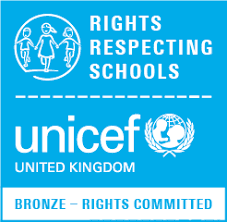
Praise and Positive Behaviour Management
All young children respond favourably to praise and recognition.
Our staff will deal with your child in a kind and caring manner. Similarly, the children are encouraged to treat each other and adults with respect and to be kind and caring. We ask that parents co-operate with us in encouraging children, by offering praise when their child copes with a difficult situation, achieves a goal, masters a new skill or behaves well.
We have refreshed our Nursery’s Positive Behaviour Policy. We introduced the 5 golden values: Walk, Talk, Share, Care & Listen. The following posters are displayed in nursery and referred to often. Stickers rewarding these specific behaviours are sometimes given.
Each session, we try to extend this by developing a Nursery Charter detailing rights and respectful behaviours, linking our 5 golden values (or rules) and our School Vision.
Here are examples of what the 5 golden values mean and ways they are explained and illustrated in nursery. You will notice that they are all phrased positively, expressing to the children what we want them to do, rather than what not to do.
| Expectation of Parents/Carers |
|
● Acknowledgement of parental role as prime/first educators ● To work together/in partnership with the school and other agencies ● Attendance and punctuality for pupils and parents (e.g. at start and end of day) ● For children to arrive, as far as possible, in a positive mind-set, appropriate labelled clothing/belongings, ready for learning (adequate sleep, nutrition, etc.) ● Modelling respectful behaviours – especially in and around school ● Open communication – share important information with us ● Support with homework, other learning tasks and home/school communication systems ● Discuss relationships and behaviours at home, with a positive mind-set ● Ask for support if/when required – we can access many agencies/provide some useful strategies to support at home ● Respect the confidentiality and needs of other children and families |
| Expectation of Pupils |
|
● Show respectful behaviour to ALL members of staff and pupils ● Choose safe behaviours, make others and yourself feel safe ● Focus on learning – it is the right of all ● Ask for help when you need it ● Use your best efforts ● Accept mistakes and failure – this is an important part of learning ● Listen to each other ● Valuing others’ opinions/feelings ● Respectful of people’s space ● Respectful of resources and property |
School Uniform
We strongly encourage the wearing of school uniform – it promotes a sense of identity and belonging to the school, the children look smart and it is relatively inexpensive.
If buying from other shops/supermarkets, the primary school colours are: navy, grey & pale blue.
The basic clothing should consist of:
- Girls – polo shirt, blouse, skirt, pinafore, trousers – grey/navy/black – jumper, cardigan – grey/navy
- Boys – polo shirt, shirt, trousers, shorts – grey/navy/black – jumper – grey/navy
School fleeces, sweatshirts in blue with school logo and polo shirts suitable for boys and girls can be ordered online at http://www.tesco.com/direct/ues/
And http://www.clothingattesco.com/icat/embschoolwear.
There is an expectation that pupils wear these colours from Primary 1 to Primary 7.
Nursery Uniform
Children can wear their normal play clothes, but please don’t wear anything too fancy! Learning in nursery is messy. We go outside every day, whatever the weather. Red t-shirts or jumpers are available on the Tesco website, as detailed above.
School Clothing Grants
The Authority can, in some circumstances, make a grant towards the costs of school clothing and footwear to those in receipt of certain benefits. Application forms are available from schools, library and information services, Customer Access Points and online at www.aberdeencity.gov.uk.
Pupil Belongings – Valuables/Jewellery
Valuable possessions (including toys) should not be brought to nursery unless parents are prepared to accept the risk of damage or loss as the school is not insured for these purposes. Pupils are discouraged from wearing jewellery for health and safety reasons. Stud earrings are permitted but any other form of jewellery is not advisable. It is stressed that these measures are taken to ensure the safety of the children in our care.
Name Labels
It is important that all belongings are labelled. Lost property is emptied termly. Please label all shoes, jackets and uniforms to avoid loss of items.
If you’d like to use name labels, the school has an account with the following company:
School ID = #24111
S – SAFE
Child Protection
Schools are required by law to report any suspected harm done to a child by possible abuse. Every school has a named senior member of staff appointed responsible for Child Protection matters. GIRFEC legislation refers to this as the ‘Named Person.’
In our school that person is the Head Teacher, Mr Markey. Or, in his absence, it is Miss Forbes, Depute Head Teacher.
Health and Safety
Safety takes a high priority in nursery. Our main school doors lock, this means that when you require entry you will have to ring for attention. Remember though, you are always welcome in school.
To further ensure the safety of children only a responsible adult can bring or collect them from nursery. Every child is signed in and out of nursery each day. Children will not be allowed to leave with anyone under the age of 16 or anyone under the influence of drugs or alcohol.
When entering or leaving the nursery or school– please ensure the door closes behind you before you depart. We do not want little children sneaking out, following after you!
When travelling to and from school you can encourage good road safety habits by using the marked crossings, which are patrolled by our lollipop people and by always holding your child’s hand when around traffic.
We ask also that parents and children should not use the school car park/gate to enter the playground and that when entering/leaving school, that the school gate is shut behind you.
We ask also that when entering/leaving school, that the school gate is shut behind you and ask that parents and children should not use the school car park/gate to enter the playground.
Accidents/First Aid
If your child has an accident in the nursery or becomes ill during the day, he/she will be treated by a first aider. For “head bumps”, your child will be given a head injury slip, which will inform you of the nature of the accident and the treatment given. We will attempt to notify you by telephone of any serious injuries. (Please ensure that you keep the school updated of any change in your emergency contact details/new mobile phone number.)
Insurance Cover
Please note: The Education Authority has no insurance cover to provide compensation in the event of a personal accident or death. It is the responsibility of the parents to insure their child, if they wish.
What to Bring
Children should wear comfortable play clothes suitable for both in and outdoor activities. As children may be outside on any day, please ensure they have a jacket and footwear suitable for the weather each day.
To aid the children with independence, clothes should be easily managed by your child when going to the toilet and dressing. Children may well get dirty at nursery – they are playing with paint, sand, water, mud and more! We ask that you do not send them to nursery wearing their ‘good clothes’. Nursery sweatshirts and polo shirts are available online from the Tesco Uniform Embroidery Service: http://www.tesco.com/direct/ues/ .
Uniform is not compulsory but the children do enjoy wearing it and look very smart in them!
It is really useful to have a pair of gym shoes and a change of underwear and clothes, which stay in nursery in a separate gym bag.
Code of Practice for Jewellery in Physical Education
Introduction
Aberdeen City Council (ACC) recognises its duty to ensure, so far as is reasonably practicable, the health, safety and welfare of employees and those affected by its activities. The wearing of personal effects, such as jewellery and watches, can present risks of injury to the person and / or others involved in an activity. Exposure to the risk of injury from such items can principally occur in Physical Education.
Code of Practice Aim
To ensure that employees and others, such as school pupils, taking part in Physical Education lessons are aware
- of the hazards of wearing jewellery & watches
- that control measures are in place to avoid the risk of injury
- that to enable individuals to understand that, as well as the right to protection, they also have to exercise responsibility
Code of Practice Scope
This policy applies to all Council schools where persons who are wearing jewellery and watches can potentially expose themselves and others to the risk of injury while taking part in Physical Education.
PROCEDURE
The following advice has been checked by our legal team. It applies to ALL body jewellery and watches and is to be followed by all schools.
- There should be risk assessments in place for all PE activities e.g. rugby, football, hockey, etc.
The risk assessments should be made specific to each activity. Wearing of jewellery should be identified as a hazard in each risk assessment with a subsequent control measure (exemption from activity, removal/cover-up of jewellery/watch, adjustment to activity, etc.). The risk assessments should be written.
- All schools should follow the advice of the Association for PE as follows:
The basic rule is that all jewellery should be removed as this then removes that particular hazard.
Where an item of jewellery cannot be removed then it is the adult teaching the group’s responsibility to try to establish a safe situation to enable participation by considering how, or if, the context can be made safe by amending the task, conditioning the activity or creating some other management strategy to make participation safe. Where safe participation cannot be assured then the pupil cannot take part in that element of the lesson.
It is good practice to regularly ask if anyone is wearing body jewellery. If they disclose this then the process of removal or considering whether safe participation can be made possible should apply.
If there is no disclosure but some body piercing is seen during the session then from that point the process above needs to be applied – remove, make safe or take no further participation in aspects of the session that would put the wearer or others at risk.
Pupils should remove their own jewellery. This should be made clear to parents and carers. If the child is unable to do this themselves, they should not wear any. School policy should explain this to parents from the outset.
- The basics of the above to be displayed in PE changing rooms, gyms etc.
- PE teachers should remind classes of this at the start of every lesson.
If teachers/schools follow the advice above, and risk assess, there should be no comeback if a pupil hides jewellery then has some jewellery related injury.
T – TEAMWORK
Welcoming and Including Parents
Finally, this induction is not simply all about your children! As parents, you are a hugely valued part of the school community – you have been your child’s first teachers and provide the main role-model in their lives. It therefore makes sense that we work together as much as possible. Here is how we can do this:
Parent Council
Hanover Street School has an active Parent Council, which relies on the support of every parent in the school. You are a member of the Parent Forum and will receive regular updates on its activities. Please try to help by becoming involved and supporting organised events.
The role of the Parent Council is to:
- support the school in its work with pupils;
- represent the views of all parents;
- encourage links between the school, parents, pupils, pre-school groups and the wider community; and
- report back to all the parents in the school (parent forum)
Parent Helpers
We hope that many of you will consider lending a hand as a parent helper in school, either on an ad hoc or regular basis. Aberdeen City Council requires all parent and adult helpers in school to complete a disclosure application before helping in school. If you’d like to help in any way, please see the class teacher.
Stay and Play Sessions
Exactly what it says… drop your child off at nursery, but stay, and PLAY!
You are welcome to join your child and the nursery in their learning. Parents are regularly given the opportunity to join in at “Stay and Play” sessions. Look out for the signing up sheets near the register/notice boards!
PEEP Group (Parents as Early Education Partners)
Miss Forbes is a trained PEEP practitioner. She meets regularly, with parents and children together, to work through the “Learning Together Programme (LTP). It aims to help parents and carers to:
- value and extend learning opportunities in everyday life
- improve the quality of the Home Learning Environment
- develop secure attachment relationships with their babies and children
- gain nationally recognised units based on supporting their child’s learning and development
By supporting parents/carers, the programme aims to improve children’s:
Personal, social and emotional development Communication and language
Early literacy Early numeracy Health and physical development
In Conclusion
We hope you have found the information in this booklet helpful. It can only give you a brief insight into our nursery.
Should you have any further queries you are welcome to talk to the staff at any time. This can be done informally as you drop off or pick up your child, or by making an appointment.
We look forward to getting to know you and your child and trust we will have a happy and fulfilling time together!
😊

